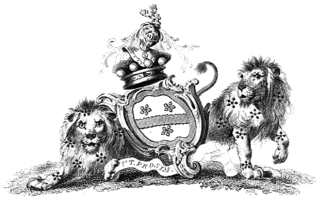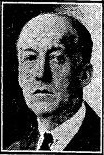Related Research Articles

Baron Foley is a title that has been created twice in the Peerage of Great Britain, both times for members of the same family.
Baron Hives, of Duffield in the County of Derby, is a title in the Peerage of the United Kingdom. It was created 7 July 1950 for the Ernest Hives, Chairman of Rolls-Royce Ltd. As of 2010 the title is held by his grandson, the third Baron, who succeeded his uncle in 1997.

Baron Glentoran, of Ballyalloly in the County of Down, is a title in the Peerage of the United Kingdom. It was created on 8 July 1939 for the Unionist politician Herbert Dixon. In 1950 he also succeeded his elder brother as third Baronet, of Ballymenock. His son, the second Baron, was also a politician and served as the last Speaker of the Senate of Northern Ireland. As of 2017 the titles are held by the latter's son, the third Baron, who succeeded in 1995. He is a former Olympic bobsleigh gold medallist as well as a soldier, businessman and politician. Lord Glentoran was one of the ninety elected hereditary peers who remain in the House of Lords after the passing of the House of Lords Act 1999, and sat on the Conservative benches until his June 2018 retirement under the House of Lords Reform Act 2014.
Baron Amwell, of Islington in the County of London, is a title in the Peerage of the United Kingdom. It was created on 16 July 1947 for the Labour politician Frederick Montague. He had previously represented Islington West in the House of Commons and served as Under-Secretary of State for Air from 1929 to 1931. As of 2010 the title is held by his grandson, the third Baron, who succeeded his father in 1990.
Baron Ogmore, of Bridgend in the County of Glamorgan, is a title in the Peerage of the United Kingdom. It was created on 10 July 1950 for David Rees-Williams, a Welsh Labour, and later Liberal, politician. As of 2020 the title is held by his grandson, the fourth Baron, who succeeded his father in that year.
Baron Kershaw, of Prestwich in the County Palatine of Lancaster, is a title in the Peerage of the United Kingdom. It was created in 1947 for Fred Kershaw, who later served as a Lord-in-waiting in the Labour government of Clement Attlee. As of 2010 the title is held by his grandson, the fourth Baron, who succeeded his father in 1962.
Baron Wise, of King’s Lynn in the County of Norfolk, is a title in the Peerage of the United Kingdom. It was created on 24 December 1951 for the Labour politician Frederick Wise. He had previously represented King's Lynn in the House of Commons. As of 2012 the title is held by his grandson, the third Baron, who succeeded in 2012. This is the latest extant hereditary peerage created on the recommendation of a Labour government.

Baron Newton, of Newton-in-Makerfield in the County Palatine of Lancaster, is a title in the Peerage of the United Kingdom. It was created in 1892 for the Conservative politician William Legh, who had earlier represented Lancashire South and Cheshire East in the House of Commons.
Baron Silkin, of Dulwich in the County of London, is a title in the Peerage of the United Kingdom. It was created on 4 July 1950 for the solicitor and Labour politician Lewis Silkin. The peerage was disclaimed by both his eldest son, the second Baron, and the latter's nephew, the third Baron. When the third Baron disclaimed the title in 2002, the barony of Silkin became the first peerage ever to be disclaimed twice; and the only disclaimer since the House of Lords Act 1999

Baron St Helens is a title that has been created three times, once in the Peerage of Ireland and twice in the Peerage of the United Kingdom.

Baron Ponsonby of Shulbrede, of Shulbrede in the County of Sussex, is a title in the Peerage of the United Kingdom. It was created in 1930 for the politician Arthur Ponsonby. Ponsonby was the third son of General Sir Henry Ponsonby and the great-grandson of Frederick Ponsonby, 3rd Earl of Bessborough. Frederick Ponsonby, 1st Baron Sysonby, was his elder brother. The first Baron's grandson, the third Baron, was also a Labour politician and notably served as Opposition Chief Whip in the House of Lords in the 1980s. As of 2017 the title is held by the latter's only son, the fourth Baron, who succeeded in 1990. He sat on the Labour benches in the House of Lords prior to the passing of the House of Lords Act 1999, when he lost his seat. However, in 2000 he was given a life peerage as Baron Ponsonby of Roehampton, of Shulbrede in the County of West Sussex, and was able to retake his seat in the House of Lords.
Baron Morris of Kenwood, of Kenwood in the City of Sheffield, is a title in the Peerage of the United Kingdom. It was created in 1950 for the Labour politician Harry Morris. He had previously represented Sheffield Central and Sheffield Neepsend in the House of Commons. As of 2017 the title is held by his grandson, the third Baron, who succeeded his father in 2004.
Baron Brocket, of Brocket Hall in the County of Hertford, is a title in the Peerage of the United Kingdom. It was created on 19 January 1933 for the businessman Sir Charles Nall-Cain, 1st Baronet. He was chairman of the brewing firm of Robert Cain & Sons, which had been founded by his father Robert Cain. Before his elevation to the peerage, Nall-Cain had been created a baronet, of the Node, in 1921. His son, the second Baron, represented Wavertree in the House of Commons as a Conservative. As of 2017 the titles are held by the latter's grandson, the third Baron, who succeeded in 1967.

Baron Baillieu, of Sefton in the Commonwealth of Australia and of Parkwood in the County of Surrey, is a title in the Peerage of the United Kingdom. It was created in 1953 for the businessman and public servant, Sir Clive Baillieu, the son of the Australian financier and politician William Baillieu. Baillieu was Chairman and President of the Dunlop Rubber Company and President of the Federation of British Industries and also worked for the British government during the Second World War. As of 2010 the title is held by his grandson, the third Baron, who succeeded his father in 1973.
Baron Darwen, of Heys-in-Bowland in the West Riding of the County of York, is a title in the Peerage of the United Kingdom. It was created on 12 February 1946 for John Davies, a prominent cotton manufacturer. He served as a Lord-in-waiting from 1949 to 1950 in the Labour administration of Clement Attlee. As of 2011 the title is held by his great-grandson, the fourth Baron, who succeeded his father in 2011.
Baron Crawshaw, of Crawshaw in the County Palatine of Lancaster and of Whatton in the County of Leicester is a title in the Peerage of the United Kingdom. It was created on 25 August 1892 for Sir Thomas Brooks, 1st Baronet. He notably served as High Sheriff of Lancashire in 1884. Brooks had already been created a baronet in the Baronetage of the United Kingdom, of Crawshaw Hall and Whatton House, on 9 February 1891. As of 2013 the titles are held by his great-grandson, the fifth Baron, who succeeded his elder brother in 1997.
Baron Cawley, of Prestwich in the County Palatine of Lancaster, is a title in the Peerage of the United Kingdom. It was created in 1918 for the Liberal politician Sir Frederick Cawley, 1st Baronet. He had previously represented Prestwich in the House of Commons and served as Chancellor of the Duchy of Lancaster from 1916 to 1918. Before his elevation to the peerage, Cawley had been created a baronet, of Prestwich in the County Palatine of Lancaster, in the Baronetage of the United Kingdom, in 1906. His grandson, the third Baron, notably served as Deputy Chairman of Committees in the House of Lords from 1958 to 1967. As of 2023 the titles are held by the latter's eldest son, the fourth Baron, who succeeded in 2001.
Baron Catto, of Cairncatto in the County of Aberdeen, is a title in the peerage of the United Kingdom. The only hereditary peerage newly conferred during the reign of King Edward VIII, the barony was created on 24 February 1936 for the businessman, banker and public servant, Sir Thomas Catto, 1st Baronet. He had already been created a baronet, of Peterhead, on 5 July 1921. As of 2018 the titles are held by his grandson, the third baron, who succeeded his father in 2001.

Baron Rea, of Eskdale in the County of Cumberland, is a title in the Peerage of the United Kingdom. It was created in 1937 for the businessman and Liberal politician Sir Walter Rea, 1st Baronet, who had earlier represented Scarborough, Bradford North and Dewsbury in the House of Commons. He had already been created a Baronet, of Eskdale in the County of Cumberland, in 1935. He was succeeded by his eldest son, the second Baron. During the Second World War he served as personal staff officer to Brigadier Colin Gubbins, the Head of SOE, a key British intelligence and guerrilla operations agency. Lord Rea served as Leader of the Liberal Party in the House of Lords from 1955 to 1967. His daughter, the Right Hon. Ann Felicity Rea, married SOE veteran Malcolm Munthe in 1945. His nephew, the third Baron, who succeeded in 1981, was a physician. He was one of the ninety elected hereditary peers elected to remain in the House of Lords after the passing of the House of Lords Act 1999, and sat on the Labour benches. As of 2020 the titles are held by his son, the fourth Baron, who succeeded his father in that year.
Thomas William Burden, 1st Baron Burden CBE, was a British Labour Party politician and church official.
References
- ↑ Morris, Susan; Bosberry-Scott, Wendy; Belfield, Gervase, eds. (2019). "Burden, Baron". Debrett's Peerage and Baronetage. Vol. 1 (150th ed.). London: Debrett's Ltd. pp. 709–710. ISBN 978-1-999767-0-5-1.
- Kidd, Charles, Williamson, David (editors). Debrett's Peerage and Baronetage (1990 edition). New York: St Martin's Press, 1990.
- Leigh Rayment's Peerage Pages [ self-published source ][ better source needed ]
